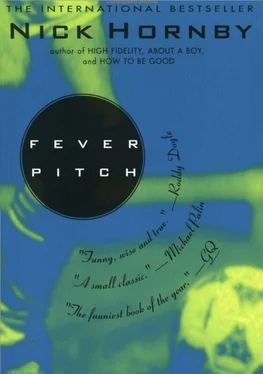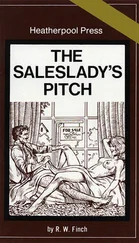It wasn’t the size of the crowd that impressed me most, however, or the way that adults were allowed to shout the word “WANKER!” as loudly as they wanted without attracting any attention. What impressed me most was just how much most of the men around me hated , really hated , being there. As far as I could tell, nobody seemed to enjoy, in the way that I understood the word, anything that happened during the entire afternoon. Within minutes of the kick-off there was real anger (“You’re a DISGRACE, Gould. He’s a DISGRACE!” “A hundred quid a week? A HUNDRED QUID A WEEK! They should give that to me for watching you.”); as the game went on, the anger turned into outrage, and then seemed to curdle into sullen, silent discontent. Yes, yes, I know all the jokes. What else could I have expected at Highbury? But I went to Chelsea and to Tottenham and to Rangers, and saw the same thing: that the natural state of the football fan is bitter disappointment, no matter what the score.
I think we Arsenal fans know, deep down, that the football at Highbury has not often been pretty, and that therefore our reputation as the most boring team in the entire history of the universe is not as mystifying as we pretend: yet when we have a successful side much is forgiven. The Arsenal team I saw on that afternoon had been spectacularly unsuccessful for some time. Indeed they had won nothing since the Coronation and this abject and unambiguous failure was simply rubbing salt into the fans’ stigmata. Many of those around us had the look of men who had seen every game of every barren season. The fact that I was intruding on a marriage that had gone disastrously sour lent my afternoon a particularly thrilling prurience (if it had been a real marriage, children would have been barred from the ground): one partner was lumbering around in a pathetic attempt to please, while the other turned his face to the wall, too full of loathing even to watch. Those fans who could not remember the thirties (although at the end of the sixties a good many of them could), when the club won five Championships and two FA Cups, could remember the Comptons and Joe Mercer from just over a decade before; the stadium itself, with its beautiful art deco stands and its Jacob Epstein busts, seemed to disapprove of the current mob even as much as my neighbours did.
I’d been to public entertainments before, of course; I’d been to the cinema and the pantomime and to see my mother sing in the chorus of the White Horse Inn at the Town Hall. But that was different. The audiences I had hitherto been a part of had paid to have a good time and, though occasionally one might spot a fidgety child or a yawning adult, I hadn’t ever noticed faces contorted by rage or despair or frustration. Entertainment as pain was an idea entirely new to me, and it seemed to be something I’d been waiting for.
It might not be too fanciful to suggest that it was an idea which shaped my life. I have always been accused of taking the things I love—football, of course, but also books and records—much too seriously, and I do feel a kind of anger when I hear a bad record, or when someone is lukewarm about a book that means a lot to me. Perhaps it was these desperate, bitter men in the West Stand at Arsenal who taught me how to get angry in this way; and perhaps it is why I earn some of my living as a critic—maybe it’s those voices I can hear when I write. “You’re a WANKER, X.” “The Booker Prize? THE BOOKER PRIZE? They should give that to me for having to read you.”
Just this one afternoon started the whole thing off—there was no prolonged courtship—and I can see now that if I’d gone to White Hart Lane or Stamford Bridge the same thing would have happened, so overwhelming was the experience the first time. In a desperate and percipient attempt to stop the inevitable, Dad quickly took me to Spurs to see Jimmy Greaves score four against Sunderland in a 5-1 win, but the damage had been done, and the six goals and all the great players left me cold: I’d already fallen for the team that beat Stoke 1-0 from a penalty rebound.
ARSENAL v WEST HAM
26.10.68
On this, my third visit to Highbury (a goalless draw—I’d now seen my team score three times in four and a half hours), all the kids were given a free Soccer Stars album. Each page of the album was devoted to one First Division team, and contained fourteen or fifteen spaces in which to glue stickers of the players; we were also given a little packet of the stickers to start our collection off.
Promotional offers aren’t often described thus, I know, but the album proved to be the last crucial step in a socialisation process that had begun with the Stoke game. The benefits of liking football at school were simply incalculable (even though the games master was a Welshman who once memorably tried to ban us from kicking a round ball even when we got home): at least half my class, and probably a quarter of the staff, loved the game.
Unsurprisingly, I was the only Arsenal supporter in the first year. QPR, the nearest First Division team, had Rodney Marsh; Chelsea had Peter Osgood, Tottenham had Greaves, West Ham had the three World Cup heroes, Hurst, Moore and Peters. Arsenal’s best-known player was probably Ian Ure, famous only for being hilariously useless and for his contributions to the television series Quiz Ball . But in that glorious first football-saturated term, it didn’t matter that I was on my own. In our dormitory town no club had a monopoly on support and, in any case, my new best friend, a Derby County fan like his father and uncle, was similarly isolated. The main thing was that you were a believer. Before school, at breaktime and at lunch time, we played football on the tennis courts with a tennis ball, and in between lessons we swapped Soccer Star stickers—Ian Ure for Geoff Hurst (extraordinarily, the stickers were of equal value), Terry Venables for Ian St John, Tony Hately for Andy Lochhead.
And so transferring to secondary school was rendered unimaginably easy. I was probably the smallest boy in the first year, but my size didn’t matter, although my friendship with the Derby fan, the tallest by several feet, was pretty handy; and though my performance as a student was undistinguished (I was bunged into the “B” stream at the end of the year and stayed there throughout my entire grammar school career), the lessons were a breeze. Even the fact that I was one of only three boys wearing shorts wasn’t as traumatic as it should have been. As long as you knew the name of the Burnley manager, nobody much cared that you were an eleven-year-old dressed as a six-year-old.
This pattern has repeated itself several times since then. The first and easiest friends I made at college were football fans; a studious examination of a newspaper back page during the lunch hour of the first day in a new job usually provokes some kind of response. And yes, I am aware of the downside of this wonderful facility that men have: they become repressed, they fail in their relationships with women, their conversation is trivial and boorish, they find themselves unable to express their emotional needs, they cannot relate to their children, and they die lonely and miserable. But, you know, what the hell? If you can walk into a school full of eight hundred boys, most of them older, all of them bigger, without feeling intimidated, simply because you have a spare Jimmy Husband in your blazer pocket, then it seems like a trade-off worth making.
SWINDON TOWN v ARSENAL
(at Wembley) 15.3.69
Dad and I went to Highbury another half a dozen times that season, and by the middle of March 1969, I had gone way beyond fandom. On matchdays I awoke with a nervous churning in the stomach, a feeling that would continue to intensify until Arsenal had taken a two-goal lead, when I would begin to relax: I had only relaxed once, when we beat Everton 3-1 just before Christmas. Such was my Saturday sickness that I insisted on being inside the stadium shortly after one o’clock, some two hours before the kick-off; this quirk my father bore with patience and good humour, even though it was frequently cold and from 2.15 onwards my distraction was such that all communication was impossible.
Читать дальше











